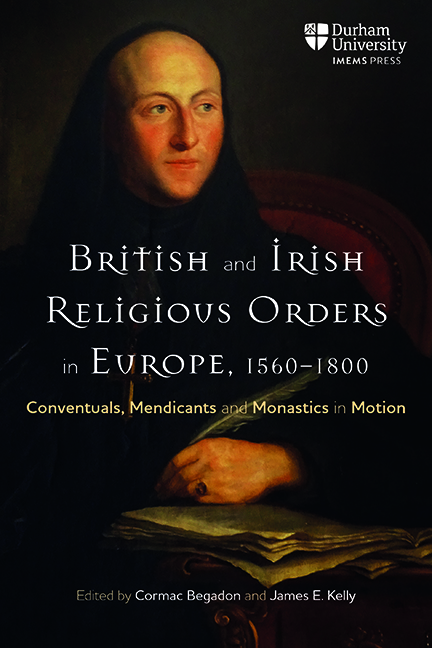 British and Irish Religious Orders in Europe, 1560-1800
British and Irish Religious Orders in Europe, 1560-1800 Published online by Cambridge University Press: 07 October 2022
One day, early in 1610, the English Canonesses of St Augustine in Louvain were troubled by an unexpected caller. The man at the grille was Fray Andres de Soto, confessor to Infanta Isabella. He had unwelcome news: the cloister was to be transferred to – as the sister chronicler put it – the Teresians. De Soto's translator on that winter morning was ‘Fr. Hew, guardian of the Irish friars’. The story had a happy ending for the English Ladies as the Irish Franciscan went on to intercede with the archduchess on their behalf. Their residence was confirmed. The nuns knew their Irish ally well since the young children of the Ulster earls – O’Donnell and O’Neill – had been placed in their care by the Irish Observants some years earlier. Fr Hew is more commonly known by his Latin and Gaelic names – Hugo Cavellus and Aodh Mac Aingil – respectively. He is also known as Aodh Mac Cathmhaoil or Hugh MacCaughwell in English. Born into a Gaelic learned family in Downpatrick in 1571, it is possible that he first studied at a local bardic school before moving on to study law on the Isle of Man. There is an unproveable tradition that he acted as tutor to the earl of Tyrone's son at Salamanca. He was certainly at the university there by 1600 and afterwards he entered the Order of Friars Minor about 1603–04. His twenty-two-year career as a mendicant saw him act as chaplain to the Irish tercio [regiment] in Flanders, as professor of theology in Louvain and in Rome, commissary in the French province of St Denis, guardian of St Anthony's Irish college at Louvain, definitor-general of the Franciscan order and, for the months preceding his death in 1626, archbishop of Armagh. Mac Aingil was a fundraiser, a planner, co-initiator of a huge hagiography project and promoter of the cult of Irish saints. He wrote in every register from Irish language hymns to a devotional treatise on confession to Latin defences and editions of John Duns Scotus and an important work on the Immaculate Conception of the Blessed Virgin. Mac Aingil's name means ‘son of the angel’ – an allusion to the winged seraph who imprinted the stigmata on Francis of Assisi.
To save this book to your Kindle, first ensure [email protected] is added to your Approved Personal Document E-mail List under your Personal Document Settings on the Manage Your Content and Devices page of your Amazon account. Then enter the ‘name’ part of your Kindle email address below. Find out more about saving to your Kindle.
Note you can select to save to either the @free.kindle.com or @kindle.com variations. ‘@free.kindle.com’ emails are free but can only be saved to your device when it is connected to wi-fi. ‘@kindle.com’ emails can be delivered even when you are not connected to wi-fi, but note that service fees apply.
Find out more about the Kindle Personal Document Service.
To save content items to your account, please confirm that you agree to abide by our usage policies. If this is the first time you use this feature, you will be asked to authorise Cambridge Core to connect with your account. Find out more about saving content to Dropbox.
To save content items to your account, please confirm that you agree to abide by our usage policies. If this is the first time you use this feature, you will be asked to authorise Cambridge Core to connect with your account. Find out more about saving content to Google Drive.